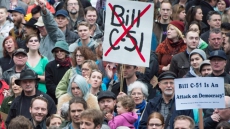OTTAWA — Many demonstrators are flattering themselves when they publicly fret about coming under the scrutiny of security services, says a former spymaster.
The Canadian Security Intelligence Service had the resources to monitor only those threats "in the red, high-risk, high-probability zone" when he served as the agency's assistant director of intelligence earlier this decade, Ray Boisvert said Thursday.
"That meant that we had no time to even consider looking at any sort of lesser evils that were emerging out there," Boisvert told the House of Commons public safety committee, which is studying a sweeping new security bill.
Boisvert, now a security consultant, said he takes "great offence" to commonly voiced concerns that the legislation would effectively place legitimate protest under the CSIS lens, adding that groups and individuals "should not flatter yourself to that degree."
Boisvert and David Harris, another retired CSIS officer, backed a legislative proposal that would allow the spy agency to actively derail terror plots — not just gather information about them.
The powers would give CSIS flexible options to handle threats, Harris told the MPs. "These can be very important in moving decisively when there may be a risk situation developing," said Harris, also a private consultant.
Under the bill, CSIS could take clandestine measures that violate the Charter of Rights and Freedoms as long as a judge approves the actions.
The provisions would conscript judges into the "dirty business" of spying, said Ziyaad Mia of the Canadian Muslim Lawyers Association.
"It turns the role of the judiciary completely upside-down," he told the committee. "This is not the role of judges in our system."
The Conservatives brought in the 62-page security bill following the murders of two Canadian soldiers just days apart last October. There was no direct link between the attacks in Ottawa and St-Jean-sur-Richelieu, Que., but it appears both assailants were inspired by extremist thinking.
The bill would also make it easier for police to limit the movements of a suspect, expand no-fly list powers, take aim at terrorist propaganda on the Internet and dismantle barriers to sharing security-related information.
The NDP opposes the legislation. The Liberals plan to support it, but outlined several proposed changes Thursday, including creation of a full-fledged national security committee of parliamentarians.





